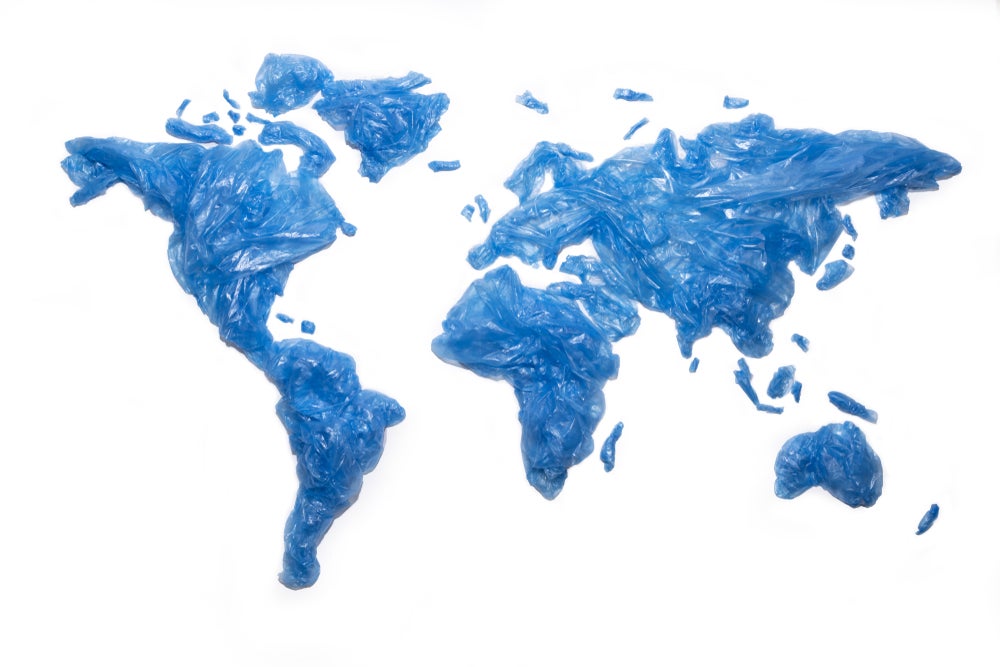
Plastics resource efficiency and recycling charity RECOUP has highlighted a major increase in the UK’s export of plastic packaging recycling in 2023.
The charity asserts that the rise shows the need for adapted waste management agreements between OECD (Organisation for Economic Co-operation and Development) and non-OECD member countries.

Discover B2B Marketing That Performs
Combine business intelligence and editorial excellence to reach engaged professionals across 36 leading media platforms.
The OECD has 38 members and is often used as a synonym for high-income or “developed” countries. Membership has therefore been considered a suitable measure to determine whether a country has the infrastructure and regulations in place to receive and process plastic waste for recycling.
UK plastic waste exports in 2023
Year-on-year, despite increases in the amount of material being recycled in the UK, plastic waste exported from England for recycling increased by more than 10% to 600,000 tonnes in 2023.
Of this waste, more than 25% was sent to Turkey – 25,000 tonnes more than in 2022. Just short of 1m tonnes of plastic has been sent to Turkey for recycling since 2017.
The next largest destination, Germany, received just under 10%, whilst material sent to Asia increased from around 9% in 2022 to almost 20% in 2023.

US Tariffs are shifting - will you react or anticipate?
Don’t let policy changes catch you off guard. Stay proactive with real-time data and expert analysis.
By GlobalData500% increase in plastic waste exports outside OECD
More than 26% of England’s plastic waste was sent to non-OECD or developing countries in 2023. This is significantly more than the 16% sent in 2022 and the 6% sent in 2021, when overall quantities were also lower. There has been an increase of 500% in three years.
This amounts to 155,000 tonnes sent to non-OECD countries. 15,000 tonnes went to non-OECD European Union (EU) member states Bulgaria and Romania, and the remainder to countries in non-EU Europe, to Asia and to Egypt.
While discussions take place around a ban on export to non-OECD countries, these figures show the market’s resilience and flexibility at a time when recycled plastic demand has been at a low across Europe, in part due to high virgin plastic production elsewhere in the world. The material exported for recycling would have otherwise gone to landfill or incineration.
Countries reported in the news as having poor quality waste management and incidences of illegal burning or burying of waste are more often non-OECD members, but high-quality reprocessing facilities do exist in a number of these countries.
Equally, OECD membership does not guarantee that all facilities and national waste and environmental policies are of a high quality.
Where is the UK’s ban on waste export?
A ban on the export of waste from the UK to non-OECD countries is expected as this was part of the governing Conservative Party’s most recent electoral manifesto. However, a consultation on the issue did not materialise as expected in 2023.
Non-OECD EU member states Malta, Croatia, Bulgaria and Romania are not included in the proposed ban, but this still leaves 140,000 tonnes of currently exported plastic in need of new receiving destinations.
EU legislation is also changing to include restrictions on the import and export of waste into the bloc, a ban on exports from the EU to non-OECD countries, and a requirement to classify any plastic exported to a country outside of the EU and European Free Trade Association as notifiable waste.
How can the UK tackle plastic waste?
RECOUP’s Plastic Waste Exports Position finds that material should only be exported as long as there is robust evidence that the infrastructure is in place to handle it and to ensure that illegal, unethical or unnecessary exports are stopped.
These factors bring into question the use of OECD membership as the sole metric for whether a country is suitable for accepting plastic waste for recycling.
The charity states that the UK requires the development of its recycling infrastructure and policies to limit the need for exporting material in the first place, regardless of destination.
RECOUP also finds that an outright ban would be inappropriate without sufficient time and planning to develop domestic infrastructure to compensate for the loss of available markets.
The consultation on an export ban to non-OECD countries will be welcome. However, RECOUP warns that further consideration is needed to ensure implementation is not at the expense of countries merely taking more material instead, or material making its way to developing countries by unregulated and illegal means.
Digital waste tracking will also be a vital future policy, albeit one that may not come to fruition until 2025. It must sit alongside revisions to the Packaging Recovery systems first designed in the late 1990s, since it was these that financially incentivised the export of waste over processing it domestically.





